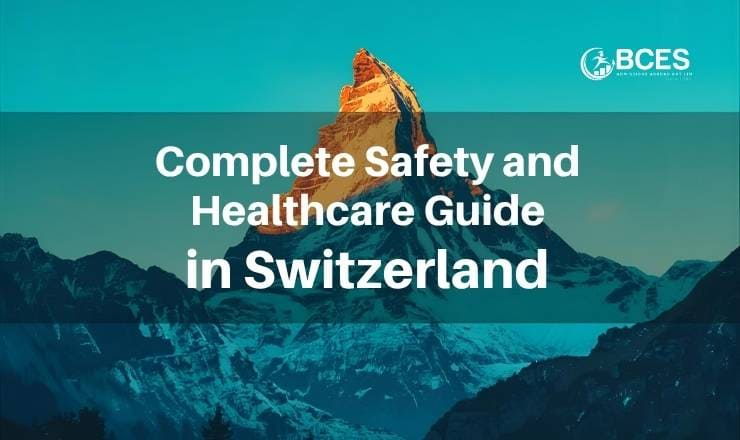Complete Safety and Healthcare Guide for International Students in Switzerland

28 October 2025
Switzerland is recognized not only for its stunning landscapes and universities recognized among the best in the world, but is also known as one of the safest and most student-friendly countries in Europe, something students often face and adjust to when relocating from other parts of the globe. Knowing safety considerations and access to health services, can only facilitate these students in feeling confident and at ease while studying abroad. Get prepared for health, safety, and everything concerned with studying in Switzerland with this informative guide.
Understanding Safety in Switzerland
Switzerland is often ranked among the safest countries in the world, making it an excellent choice for international students. Study destinations, including Zurich, Geneva, and Lausanne, all offer a secure setting with welcoming communities. That said, it’d always be prudent to stay aware of your surroundings and take sensible precautions.
Public Spaces: As with any busy space, you will want to be mindful about petty theft. It is not common, but things might happen in crowded areas. Always carry zipped bags and secure your stuff.
Using public transportation: Public transportation in Switzerland is fantastic. Always have a valid and correct ticket and check the timetable so that you do not get a ticket.
Respect local customs and laws: There are some laws you should be aware of regarding rubbish, noise, and drinking laws. If you are respectful of the above, you should find it relatively easy to integrate.
Emergency numbers: Make note of the following emergency numbers; 112 (general emergency), 117 (police), 118 (fire), and 144 (medical emergency).
Being prepared and informed should ensure an enjoyable and safe study experience.
Swiss Healthcare System for Students
Switzerland has one of the most advanced healthcare systems in Europe and provides outstanding healthcare for all residents, including international students. After you register with your university, you will be required to obtain health insurance within three months of arrival.
Basic Health Insurance: Medical treatment, consultations with doctors, hospitalization, and medication prescribed by a doctor are covered.
Private Health Insurance: This may cover some additional expenses, isolation, dentistry, and the like.
Most universities are to be sure to help their students find the right insurance coverage, but every student must have access to adequate health care during their stay.
Access to Services in Switzerland
In Switzerland, healthcare is accessible and professional. You would preferably visit a general practitioner for common health issues; if it’s an emergency, you will need to walk into a hospital. Many universities have student health centers, where you can consult with a medical professional on a more basic health issue and receive some treatment.
You will also want to carry your health insurance card, personal ID, and/or emergency contact information with you at all times. Pharmacies are found in all towns and cities (you can recognize them by the green cross signs). Pharmacists can assist you with minor health issues and advise you on when you should see a doctor.
Mental Health and Wellbeing
Living and studying in a foreign country can, at times, be stressful, whether it be with culture shock, or the strain of your studies. Swiss institutions take student mental health seriously. Most colleges provide free or confidential counseling services on-campus, or in some institutions, workshops and support groups may support you building resilience to manage stress and emotional well-being.
Another option to meet new friends and build your support network while in Switzerland is to join clubs, sports teams, or student organizations.
Health and safety tips for students
- Keep both digital and hard copies of all your important documents (like your passport, residence permit, and insurance policy).
- Once you arrive, you will be required to register at the local municipality to complete residence formalities.
- Watch the weather, especially in the winter, as snow and ice may impact traveling.
- Eat a healthy diet and exercise: Switzerland has many opportunities to be active outdoors, such as hiking and cycling.
- Learn some basic phrases in German, French, or Italian, depending on where you will study. This can help in an emergency or during everyday interactions.
At BCES Admissions Abroad, we assist international students at every stage – from selecting a university, to obtaining a visa, and acclimating to a safe environment. With trained counsellors, we ensure that you have full support through accessing healthcare, maintaining safety and settling into life in Switzerland. Our goal is a successful, healthy and safe study experience abroad.
Frequently Asked Questions (FAQs)
Yes, Switzerland ranks among the safest countries in the world. Students have a safe and peaceful stay at all times.
Yes, all international students need to have valid health insurance while studying.
Some international health plans are accepted, but you will want to check with your insurance company or university before you arrive.
Call 144 for an ambulance, or go directly to the nearest hospital emergency department.
Most doctors and hospital staff speak English in the cities or hospitals with a university.
Swiss universities provide counseling and mental health support as needed to help students emotionally and academically.